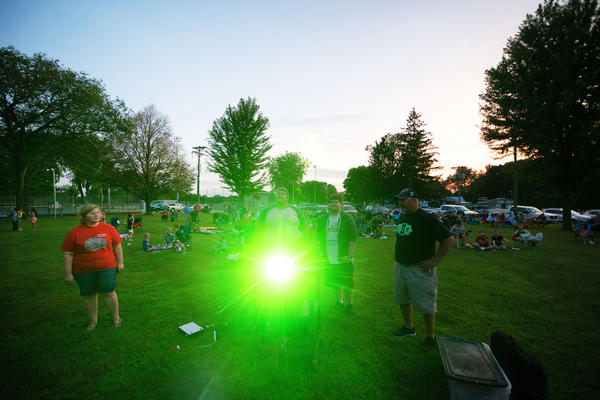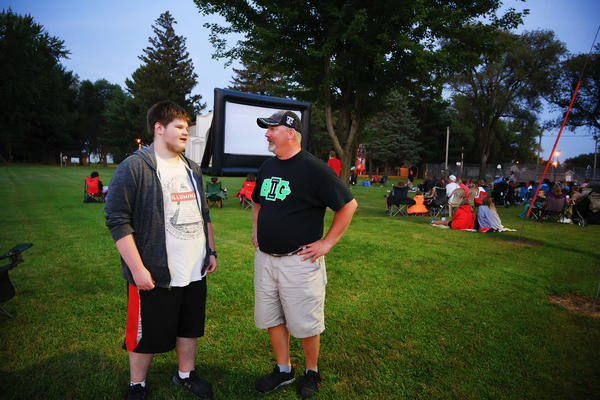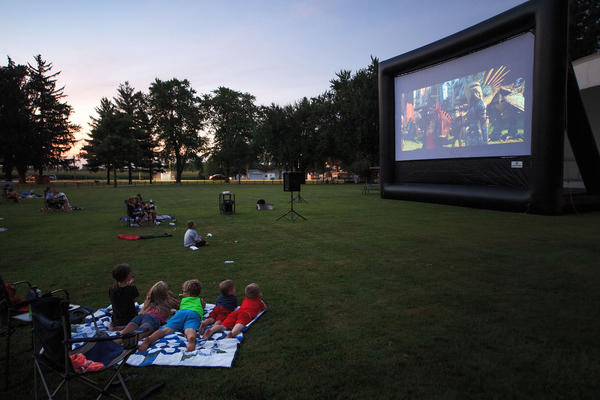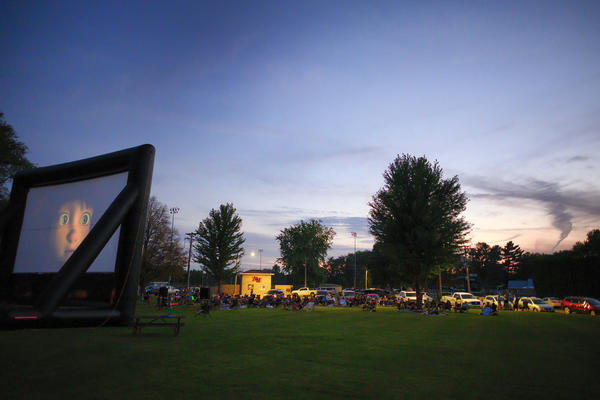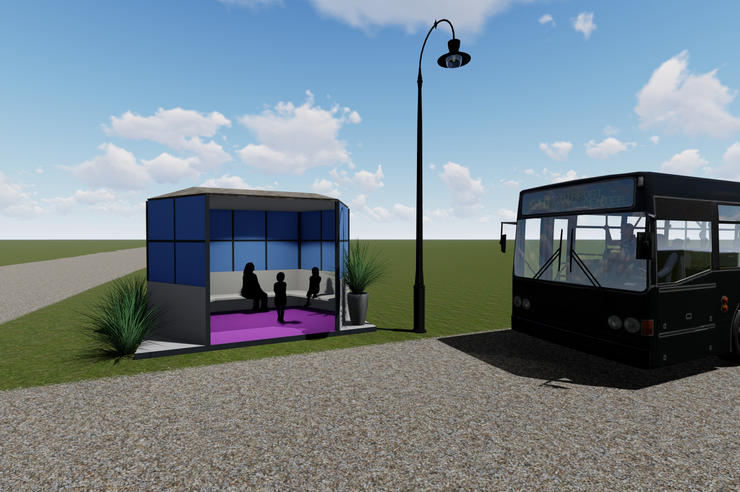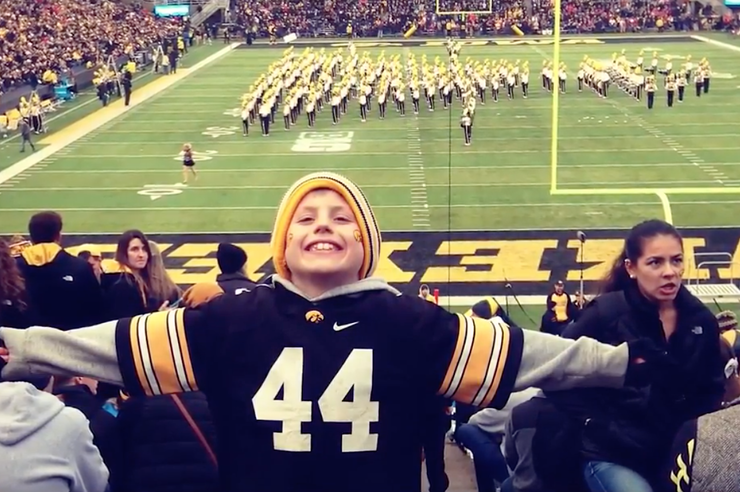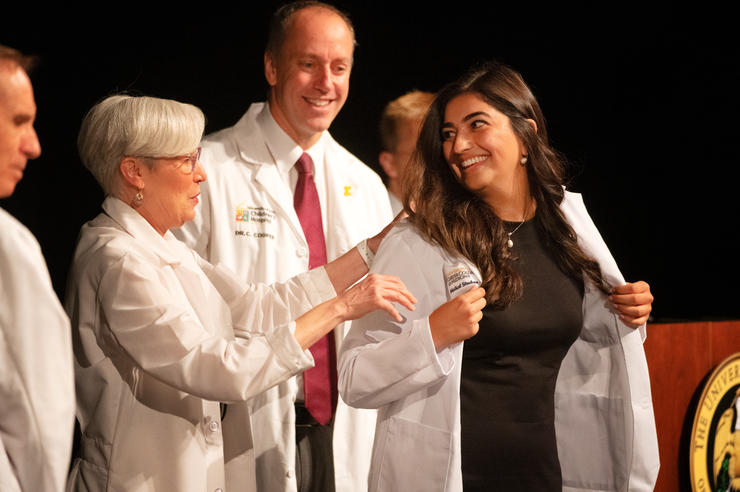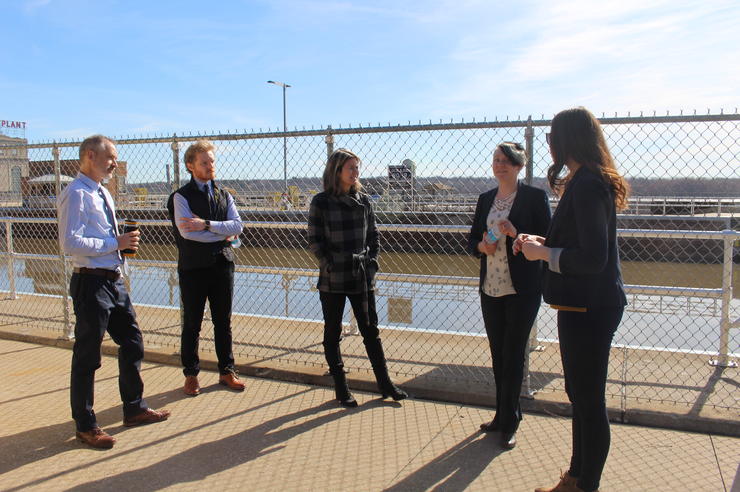Business ideas bloom in Iowa, thanks to UI and young minds
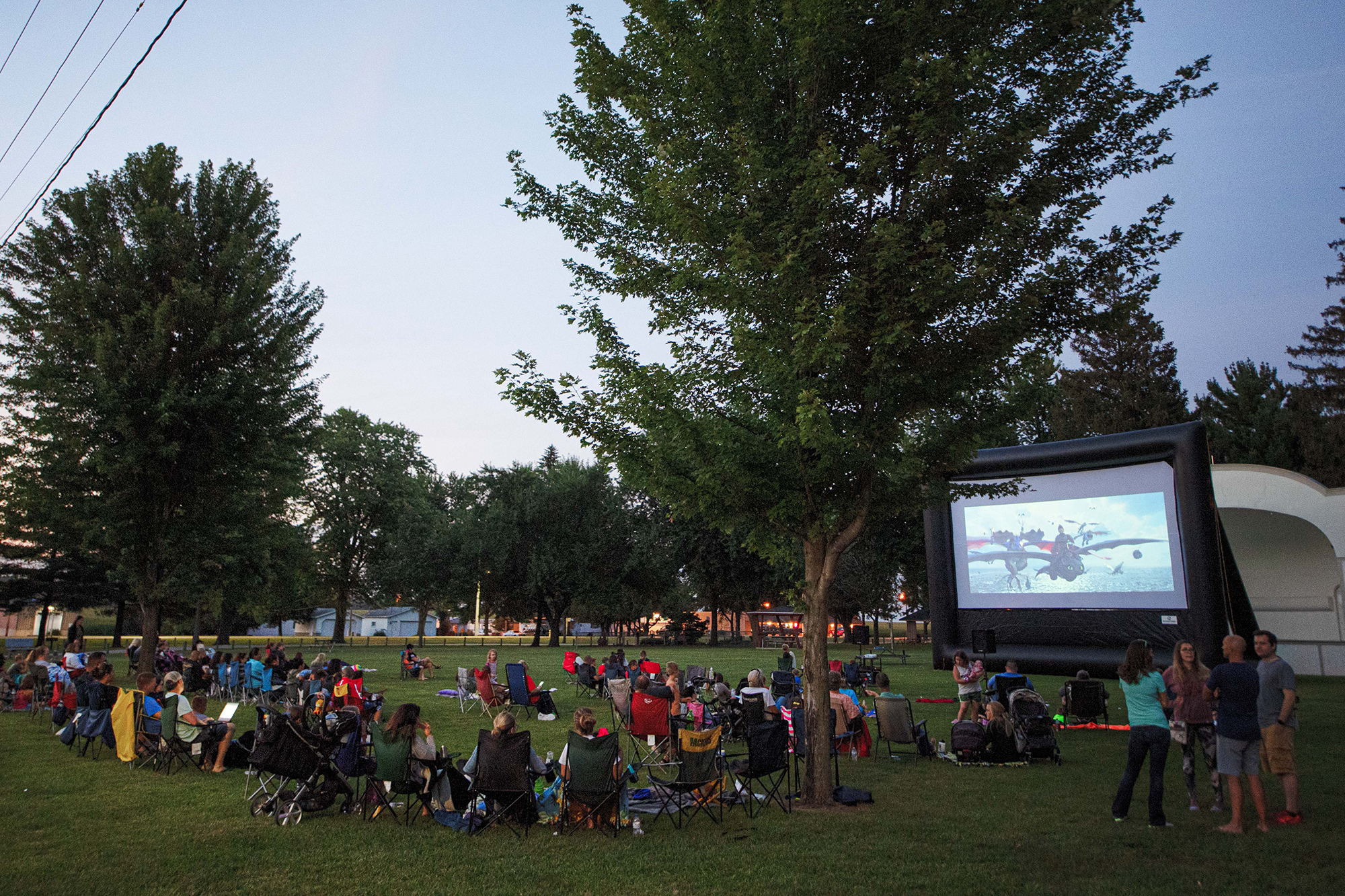
Like kids in small towns everywhere, young people in New Hampton and Charles City, Iowa, were often quick to comment that “there’s nothing to do here.”
New Hampton residents spent a summer Friday night at Mikkelson Park, where area high school students’ portable theater screen was used to show a movie from the How to Train Your Dragon series. The theater business is an outgrowth of STEM Innovator, an education framework for K–12 students created by the University of Iowa’s Jacobson Institute to develop 21st-century and workforce-readiness skills.
So a group of high school students decided to do something about it. Working through a class offered at New Hampton and Charles City high schools, in 2017 they started their own business, a portable drive-in movie theater, to give people something to do on summer evenings.
“The students said there weren’t enough healthy lifestyle choices for kids in our communities, says Mike Kuennen, the teacher at New Hampton High School whose students had the idea. “And as someone who grew up not far from here, I could relate.”
Kuennen helped the students arrive at their solution by drawing on the lessons he’d learned through STEM Innovator, an education framework for K–12 students to develop 21st-century and workforce-readiness skills. Created by the University of Iowa’s Jacobson Institute, STEM Innovator puts students alongside business and industry leaders in their communities to apply entrepreneurial principles and solve real-world business problems. The program also provides teachers with tools to help students think creatively.
Dawn Bowlus, director of the Jacobson Institute in the UI John Pappajohn Entrepreneurial Center, which supports the program, says STEM Innovator answers a national call to action to prepare students with the skills to participate in a technologically advanced workforce.
“Employers make it clear they want employees equipped to be adaptable, resilient, empathetic, critical thinkers—creative and with the ability to effectively communicate,” says Bowlus. “The Jacobson Institute is passionate about giving students opportunities to develop and hone these skills.”
The program started in 2013 and has received ongoing support from several Iowa economic-development agencies and the Iowa Governor’s STEM Council. Teachers participate in both online and face-to-face professional development sessions, including a weeklong conference held every summer at the Kirkwood Regional Center in Coralville, Iowa.
Kuennen first attended in 2016 when his school and several surrounding rural schools worked together to design a model for innovation and entrepreneurship education. He says STEM Innovator provided educators with the time to collaborate and design a unique program that would work for their specific communities and help their students gain the exposure and skills they need to be successful.
“We came the first year so we could get a plan in place, and we come back each summer to collaborate with experts at the University of Iowa and with other educators across Iowa and the nation,” Kuennen says, adding that STEM Innovator is the best teacher training he’s participated in.
Educators leave the program with graduate school credits, certification as a STEM Innovator instructor, and lots of new ideas on how to prepare students for an innovative and technologically driven workforce by transforming their classroom into a problem-solving incubator. And, by submitting a portfolio of their work, participating students can earn University of Iowa credit transferable to schools across the country.
“The students bring a fresh new perspective on our challenges and push us to think outside the box, which is always beneficial for an organization.”
The STEM Innovator framework guided Kuennen’s students as they identified the problem of not having enough to do and assisted them in evaluating possible solutions. The city’s most recent movie theater burned down in the 1980s, but students knew a new permanent theater was not an option due to expense. Instead, the framework taught them how to gather and evaluate data that would drive their decisions, ultimately leading them to create a portable drive-in theater.
They set a goal to raise $10,000 to buy an inflatable movie screen and Bluetooth movie projector. But local businesses were so impressed with the pitch, they donated $15,000.
The students were in the movie business by 2017. Two years later, the business is still thriving, using the inflatable screen to show movies several weekends during the summer, and renting it out to other organizations as well.
For more information about STEM Innovator and to learn how to bring it to your school, visit STEMInnovator.org or contact Leslie Flynn at stem-innovator@uiowa.edu.
Kuennen credits what he learned through the STEM Innovator training for the business’ success.
“It’s a great way for students to learn a framework for how to solve authentic problems,” he says. “It provides an opportunity for students to practice the skills they will need, regardless of their career path. They have to collaborate, adapt, be resilient, figure out what comes next, and keep their focus on creating solutions people want and will use.”
More than 46,000 students in 116 Iowa schools have learned from the program in its first six years, and the framework is also used by schools in 32 other states. The program has received significant state and national recognition for its work, including a national partnership with the United States Patent and Trademark Office, which Bowlus says has a vested interest in the development of the nation’s innovation ecosystem. The Jacobson Institute has also partnered with several national networks seeking to create innovation opportunities for young adults. The program was named a top-ten Iowa STEM program by the Iowa Governor’s STEM Council to bring the program to schools across Iowa.
Leslie Flynn, clinical assistant professor of innovation and entrepreneurship in the Tippie College of Business, is developing a competency-based portfolio measuring the impact of innovation, invention, and entrepreneurship on student development of workforce readiness. She says a three-year longitudinal study indicates students working with industry experts to solve a problem of student and community interest increases both student interest and competency in STEM and workforce-ready skills. The increases are significant for all students, including female students and those from underrepresented groups.
“This is particularly important as it may drive more of these students to participate in STEM and entrepreneurial ventures following high school,” Flynn says.
“We came the first year so we could get a plan in place, and we come back each summer to collaborate with experts at the University of Iowa and with other educators across Iowa and the nation.”
Students have solved problems for businesses around the state and in some cases started their own, including a greenhouse that grows and markets fresh produce and IT consulting services. Donna Forsyth, who uses STEM Innovator in her classes at Charles City and New Hampton high schools, says the framework is effective because it breaks down the process of solving problems and developing solutions in a way that high school students can understand and relate to.
Forsyth’s students have gone on to work with several local businesses as consultants. One such business, Cambrex, a pharmaceutical manufacturing facility in Charles City, has worked with teams of Charles City High School students on four projects so far and is thinking about what they can do for a fifth.
Elaine Jennings, director of process improvement at Cambrex, says her team thinks about projects in advance and puts together a plan that will not only help the company, but give the students a worthwhile experience too.
“We want the project to build skill sets that will be beneficial for the students in the workplace,” she says. “We give them opportunities to do PowerPoint presentations, compile metrics, perform cost analyses, and write professional emails and project-definition documents. We want it to touch on STEM concepts while also helping the company.”
One project that was particularly helpful to Cambrex was finding a way to dispose of large plastic water containers that can only be used a certain number of days because of potential microbial growth. In the past, Jennings says those containers—or totes—would simply be sent to landfills. But she says the Charles City students researched alternative disposal methods and found a company that would take the containers off Cambrex’s hands and recondition them for sale to other businesses. As a result, Cambrex was able to make a positive impact to the environment by keeping the totes out of the landfill and save nearly $200,000 in the first year.
“The students bring a fresh new perspective on our challenges and push us to think outside the box, which is always beneficial for an organization,” says Jennings.
But she says the best part about the program is watching the students learn and seeing their confidence develop.
“It’s been enjoyable to see their growth,” she says. “Some of them are so shy at the start they have a hard time conducting a presentation just in front of their friends, but by the end, they’re giving a presentation in front of 100 local business people.”
Similarly, in Leon, Iowa, educators and economic development officials are using STEM Innovator to get a new business incubator off the ground this fall that they hope will keep young people in the area. Providing real-world, hands-on business opportunities was key, not only to give the students experience but to provide local businesses with help they needed, says Shannon Erb, director of the Decatur County Development Corporation.
She says their idea was to start a business incubator designed specifically for Central Decatur High School students to learn business skills, start their own businesses, and partner with local businesses to provide consulting services. The NEST—Nurturing Entrepreneurial Students for Tomorrow—opened in May in the downtown community center after a fundraising campaign raised $20,000. It will host its first business and entrepreneurship students this fall.
“It’s a way to connect businesses with students and help develop our workforce,” says Erb. “It’s also a place where students can learn to think as entrepreneurs and about the tools needed to run a business, such as creating a business plan, making financial projections, or researching a business.”
Erb and Larry Johnson, the business and entrepreneurship teacher at Central Decatur, teach the class. Both attended this summer’s STEM Innovator sessions and plan to incorporate much of what they learned into their curriculum.
“It will fit nicely as a unique teaching tool that encourages students to think creatively and solve problems that clients will bring them,” says Erb.
She says 30 students have signed up for the class, considerably more than the 10 or 12 they had expected. These students will work with five local businesses, including an accounting firm, movie theater, and retail stores. A survey of local businesses showed a frequent need for help with marketing, so Erb says the students will focus on providing those services.
“The students will learn about working in teams, working with a client, and have the opportunity to fail and learn from that failure in a low-risk environment,” she says.
